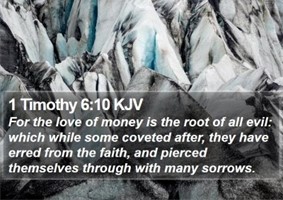A RICH MAN’S SORROW

Many times in the gospels we read of people coming to Jesus, seeking help and healing, seeking relief from their sorrows ‒ invariably we find the Lord able and willing to heal, to touch and deliver. In Matthew 19, however, we read of a man who came to Jesus seeking answers, but left “sorrowful” (v 22). The encounter arrests our attention, especially because the man seemed off to a promising start: he came asking the Lord, not for earthly healing but for eternal life (v 16).
But this man had a serious and deadly problem, which the Lord knew, and brought out in His wise and gentle way, in the course of this brief conversation. Though seemingly off to a good start, this young man’s heart was in terrible spiritual danger. His problem was his riches ‒ more specifically, his view of himself, his soul, in the context of his wealth and possessions. This is a danger in our times as well, for we live in a society and culture that greatly prizes money, wealth, and material possessions. These things skew our evaluation of ourselves and others; they affect the way we form our ambitions and desires; where we rest our security; our relationships with others. We need to pay heed to the response of Jesus to this young man.
The Lesson of the Law
In the first place, Jesus pointed the young man to the law of God, the Ten Commandments. The man’s question was, in effect, how can I earn eternal life, how can I work for it, how can I deserve it. Jesus pointed him to the law, as laying out God’s righteous and holy standard of goodness. The man thought he was good already (this is evident from his answer, v 20); he thought Jesus was good (as a man, a teacher, and no more) ‒ Jesus told him in no uncertain terms, that only God is good (v 17). In fact, Jesus’ answer here was pointing the man to an important lesson: that “there is none righteous, no, not one” (Rom 3:10).
Only God is good, Jesus tells the man ‒ if you disagree, if you think you are good enough for God, then keep His commandments, and prove your goodness. The attempt, of course, is doomed for failure, for the law by nature and by design shows us our utter lack of righteousness. The law brings us to a knowledge of our sin (Rom 3:20); this is its purpose. It points us to our spiritual bankruptcy; it reduces us to nothing before a just and holy God.

The law gives us that poverty of spirit, which puts us on the path to true blessing (Matt 5:3); the law pulls the wool from our eyes, shows our supposed spiritual riches to be but filthy rags, and so sets us seeking for true spiritual treasures. This young man needed the law to show him that he was not, in fact, good ‒ but he was blinded.
The Deceitfulness of Riches
What was blinding him? What was hindering him? He had succumbed to the deceitfulness of riches (Matt 13:22). There is a great tragedy here: the young man obviously senses that something is wrong; he has come to Jesus, not pretending to have everything, but knowing that something is missing; when pointed to the law, he does not merely say that he has kept it, but goes on to ask, with terrible urgency, “what lack I yet?” (v 20).

Jesus points him more specifically to his problem, diagnosing the danger and pointing to the cure. “Go and sell that thou hast, and give to the poor, and thou shalt have treasure in heaven: and come and follow me” (v 21) ‒ the equivalent of “deny self, take up the cross, and follow me,” but applied specifically to this young man’s heart. He had no treasure in heaven, because all his focus was on his supposed treasure on earth. He was neglecting his duty to his neighbour, and falling short of the holy standard of God, because his heart was ensnared in the love of money. The tragedy here is that he, evidently, wanted eternal life; he wanted heaven ‒ but he wanted his earthly treasures more. So he chose the love of money, rather than the love of God, and went away, on the road to perdition, sorrowful (v 22).
Conclusion
So it is also today, all too often. The principle remains true: no man can serve two masters (Matt 6:24). There are many who are tragically unwilling to lay hold on eternal life, because the pearl of great price pales in comparison to the allure of money and material possessions. In truth that pearl is worth all the world, and more; but the deceitfulness of riches is such that it corrupts our hearts and perverts our calculations. This is why the Lord warns the disciples, “a rich man shall hardly enter into the kingdom of heaven.”
The world around us desires riches ‒ but, dear Christian reader, be warned! When all around you are chasing wealth, working long hours, heedless of spiritual things, because money, more money, is their aim, be warned! “They that will [or, desire to] be rich fall into temptation and a snare” (1 Tim 6:9). Earthly riches can so easily blind us to our spiritual poverty, and take the place of God as our security, and rob us of our treasures in heaven. Let us be mindful of the danger and seek the kingdom of God ‒ then let us use what we have, in the fear of God, as stewards of His bounty, and guided by the love of neighbour (see the good example of Job, by his own testimony, Job 31:16-23).
MILLIONAIRES SELDOM SMILE
John D Rockefeller

Where is happiness found? John D Rockefeller, a Christian millionaire, said, “I have made millions, but they have brought me no happiness. I would barter them all for the days I sat on an office stool in Cleveland and counted myself rich on three dollars a week.”
William H Vanderbilt

W H Vanderbilt said, “The care of 200 million dollars is too great a load for any brain or back to bear. It is enough to kill anyone. There is no pleasure in it.”
John Jacob Astor

John Jacob Astor left five million, but had been martyr to dyspepsia and melancholy. He said, “I am the most miserable man on earth.”
Henry Ford

Henry Ford, the automobile king said, “Work is the only pleasure. It is only work that keeps me alive and makes life worth living. I was happier when doing a mechanic’s job.”
Andrew Carnegie

Andrew Carnegie, the multi-millionaire, said, “Millionaires seldom smile.”
[Source: Encyclopedia of 7700 Illustrations, by Rev Dr Paul Lee Tan whom the Lord had called home on October 28, 2024. His life verse: “And whatsoever ye do, do it heartily, as to the Lord, and not unto men; Knowing that of the Lord ye shall receive the reward of the inheritance: for ye serve the Lord Christ.” (Col 3:23-24). We bid farewell ta good friend of FEBC and fellow servant of the Lord, till Jesus comes again. ]

